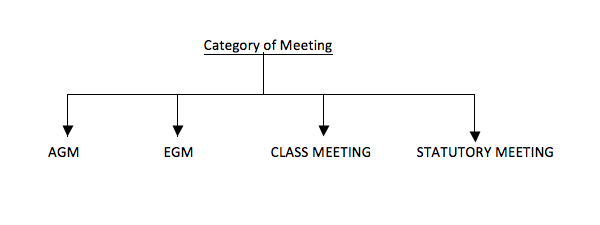In this blog post, Rahul Ranjan, a Third Year student studying at Vinoba Bhave University, Hazaribagh, Jharkhand and pursuing a Diploma in Entrepreneurship Administration and Business Laws from NUJS, Kolkata, analyzes the concept and application of an Annual General Meeting.
Introduction
The Annual General Meeting (AGM) of Company acts as a bridge between Members and Management. The meeting may be defined as gathering or assembly of some persons for transacting any lawful objects. Under Company Law, the mere gathering or assembly of persons doesn’t constitute a meeting. Company Meeting must be convened and held in perfect compliance with the various provisions of the Companies Act 2013 and allied rules framed under the law.
To increase emphasis on adherence to norms of good corporate governance, Company Law assumes an added importance in the corporate legislature by the arrangement of AGM regularly according to the provisions prescribed by law.
The new Companies Act, 2013 deals with a better regulatory framework for increased disclosure, enhanced shareholders voting right and easier management interaction, providing equal opportunities to and prospects for or stakeholders. It is important that the members and management together use the AGM forum to build a strong capital market environment. AGM provides a small window to the shareholders to look into the affair of management and can influence in a right way.
According to Mozley & Whitley’s Law Dictionary- Meeting means a gathering or assembly of person convened for the conducting of business, i.e., of a company, or relating to the affair of bankrupt. A company is composed of members, though it has it’s on the entity for the time being distinct from the members, constitute the company, as a corporate entity. A Company, being an artificial person, can not act on its own and therefore, it expresses its will or takes its decision through the resolution past at validly held meetings. The prime objective of a meeting is to ensure that a company gives a reasonable and fair opportunity to those who are entitled to participate in the meeting to take a decision as per the prescribed procedures.
Annual General Meeting (AGM)
AGM’s in India continue to remain completely off the mark compared with the impacts of AGMs of Companies in rest of world. In India, AGMs have been about forcefully ahead with the majority shareholders view and completing a critical legal requirement imposed on the company.
 AGM is an annual event where the members and management of a company interact with the purpose of discussion on the activities performed by the company during the whole year. Section 96 of the Act provides that every company, whether they are private or public, other than a one person company is required held an annual general meeting every year. SS-2 ( Secretarial Standard 2 ) on general meeting issued by the ICSI and approved by the central government that is to be mandatorily adhered by all companies as per the provision of section 118 (10) of the Companies Act 2013. SS-2 provides that the Board shall, every year convene or authorize convening of a meeting of its members called the AGM to transact items of ordinary business specifically required to be transacted at Annual general meeting as well as the special business if any. The newly enacted company Act 2013 makes compulsory for all type of companies to hold an AGM every year. The various transactions like approving company’s financial statement and the report of Board of Directors & Auditors, approving dividend, appointment or fixation of remuneration of the director are among important activities that obligate companies to seek a majority of shareholders approval every year.
AGM is an annual event where the members and management of a company interact with the purpose of discussion on the activities performed by the company during the whole year. Section 96 of the Act provides that every company, whether they are private or public, other than a one person company is required held an annual general meeting every year. SS-2 ( Secretarial Standard 2 ) on general meeting issued by the ICSI and approved by the central government that is to be mandatorily adhered by all companies as per the provision of section 118 (10) of the Companies Act 2013. SS-2 provides that the Board shall, every year convene or authorize convening of a meeting of its members called the AGM to transact items of ordinary business specifically required to be transacted at Annual general meeting as well as the special business if any. The newly enacted company Act 2013 makes compulsory for all type of companies to hold an AGM every year. The various transactions like approving company’s financial statement and the report of Board of Directors & Auditors, approving dividend, appointment or fixation of remuneration of the director are among important activities that obligate companies to seek a majority of shareholders approval every year.
In the era of globalization or emergence of easy access to the Internet, the company’s act 2013 inserted the provision of e-voting to increase the shareholder’s participation and their feedback. It is important that one of the important provisions of newly enacted companies act 2013 is that the companies may be forced to seek votes from the minority shareholders for the approval on implements some of the management actions.
Key Provisions of Holding an AGM
- AGM should be held once in each calendar year.
- First AGM of the company should be held within 9 months from the closing of first financial year,

- Subsequent AGM of the company should be held within 6 months from the date of closing of relevant financial year,
- The gap of two AGM should not exceed 15 months, or
- A One Person Company (OPC) is exempt from holding AGM
Extension regarding holding of an AGM
In the case of failure, the registrar for any special reason, extend the time within which any AGM shall be held, and such extension can be a period not exceeding three months. The registrar can grant no extension of time for holding of the first AGM.
Penalty for failure in holding of an AGM
Section 99 of the Companies Act 2013 provides that if any default is made in complying or holding a meeting of the company, the company & every officer of the company who is in default shall be punishable with fine which may extend to one lakh and in case of continuing default, with a further fine which may extend to 5000/- per day during which such default continues.
Business to be transacted at an AGM
Section 102 (2) (a) provides that all other business transacted at AGM except the Special Business:-
(a). Consideration of Financial Statement, Board’s report & Auditor’s report,
(c). The retirement of Director & appointment of Director in place of retirement
(d). The retirement of Auditor, the appointment of an auditor in place of those retire & fixing of the remuneration of auditors,
(e). Review the audited Financial Statement,
(f). Approve any proposed amendment to the declaration, by lawful rules or agreement,
(g). The vision statement of the company,
(h). Report of corporate governance,
(i). Information on a share of the company, i.e., information on the historical performance of share price, shareholding pattern of the company, pledging of share by promoters during the year, the split of share, bonus share distributed, etc.
(j). Management Discussion & Analysis (MDA)
It provides information on trends in industry, SWOT Analysis of the company, insight into important aspects of financial statement and risk factor related to the performance of a company.
Conclusion
From the above discussion, it becomes quite clear that the holding or arrangement of AGM is mandatory on the part of both company laws as well as on the part of the management of the company. The holding of an AGM is mandatory for all type of company irrespective of private as well as a public limited company except OPC, i.e., One Person Company. The annual event of AGM every year established the clear and transparent relationship between the members and management. The AGM provide the equal opportunities of growth to all stakeholders of the company whether they are members and management.
 Serato DJ Crack 2025Serato DJ PRO Crack
Serato DJ Crack 2025Serato DJ PRO Crack











 Allow notifications
Allow notifications



A very good article by Rahul Ranjan. This can be replicated by well-intentioned members of other associations / registered societies for betterment and increased disclosure of the affairs.